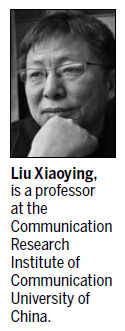- By Li Yang
 China Daily, September 2, 2010
China Daily, September 2, 2010
:
As the sleeping dragon awoke toward the end of the last century, the West felt uneasy. And when it took off on the road to rapid economic development, the West's unease began turning into fear, giving rise to the "China threat" theory which is bandied about so rampantly across the world today.
Is there any justification behind this theory? China Daily put this question to Liu Xiaoying, a professor at the Communication Research Institute of Communication University of China.

In short, Liu's answer is "no". But he prefers to delve deep into the reasons behind, what he says is, the unjustified fear gripping the West.
Some people try to attribute the country's economic rise to "China's development model", Liu says, building an insurmountable barrier between the East and West, between antiquity and modernity.
"China is just regaining its long lost right to have its say in world affairs. Harmonious coexistence of countries entails diverse views, not a hegemonic monopoly which presumptuously claims to speak for all the countries." The fact is that the Chinese leadership has too many domestic problems to solve and doesn't have the time to pose a threat to other countries or regions.
Historically, the rise of a country has created controversies and raised the concern of its neighbors and, above all, the existing powers. It's natural for the West to nurse such views as the "China threat" theory. But it shouldn't deny China from having its say.
Chinese people can have their say by solving their problems, building the country's image and ridding the rest of the world of its misunderstanding and prejudice against China through their actions.
Among those actions, transparency takes the top spot. The West has long based its "China threat" theory on the blown-up image of the country's economic success presented by the Chinese media. The Chinese media may be over-enthusiastic but since ancient times, Chinese politicians have considered economic growth as the best justification for being in power.
The Chinese government's goal is to build a harmonious society not only in the country, but also across the world. A harmonious society, however, is by no means a system dominated by one single thought, rather it is more of a system based on diverse thoughts, the best of which are combined to bring the maximum benefit to the country and its people. It is to be understood that covering our drawbacks will intensify the tensions in the social system. This could create an obscure image of China, which would give the West enough room to indulge in rumor-mongering.
The government should have the confidence to face up to the problems that its fast paced economic development has created, Liu says. "Western countries had enough time and space to transform their economic structures. As a result, the advantages they still enjoy in many fields have resulted in much of the ills afflicting the developing world. The West transfers only the lower links of its industrial chain to the developing countries, which carries with it pollution and social costs. How in the world then can the West be justified in accusing China of posing a threat, especially when the Chinese government's only goal is to improve the livelihood of its people?"
Let one thing be clear, China does not enjoy the luxury of time to lift millions of its people out of poverty and transform its economic structure. That is to say China cannot afford to follow in the footsteps of the West, although it is interacting with the rest of the world to explore how things can be best turned around.
As American writer Owen Lattimore put it, China's history is actually a process of cultural communication between nomadic and farming civilizations across the Great Wall, the Yellow River and even the Yangtze River. Thus China's development model has never been static. So there cannot be a "China development model". If there is any, it is a dynamic, ever-changing model characterized by frequent exchanges of commodities and, to a lesser extent, cultures.
Liu says the government needs to portray the country as a cultural being and depoliticize its story-telling style. But, many people argue, how can the government do that when Chinese culture is highly influenced by foreign cultures? Liu doesn't share the view of the skeptics. He says cultural exchange and mutual influence take a long time to bring about changes. So, it's naive to predict the downfall of Chinese culture and to deny its dynamic nature.
The problems that the early stages of the cultural industry's commercialization face do not necessarily endanger the cultural heritage of a country. Instead, a deep understanding of Western cultural industry would not only help make the Chinese media more competent, but also be conducive to finding universal values that China and the West share.
Liu says China should not neglect the universal values present in its social practices. "Universal values are something that all civilizations share Any attempt to turn universal values into an ideology exclusive to a country or region would be dishonesty."
In fact, the West, especially the US, has already suffered because of its short-sightedness to colonize and materialize universal values, irrespective of the practical national conditions of other countries. There are many ways, apart from the American way, of guaranteeing democracy, freedom and human rights. The US domination of the world cultural market and the thought domain relies more on its economic and military buildup than its clumsy understanding of diversity.
Chinese people, in general, have first-hand knowledge of middlebrow philosophy, and Liu is no exception. He argues that China's struggle to claim the rights to have its say in world affairs should be guided by "balanced" logic, which means Chinese people should provide balanced information about their country.
 Khách mua chuộng những căn biệt thự hướng biển. Ảnh: PLTP.
Khách mua chuộng những căn biệt thự hướng biển. Ảnh: PLTP.